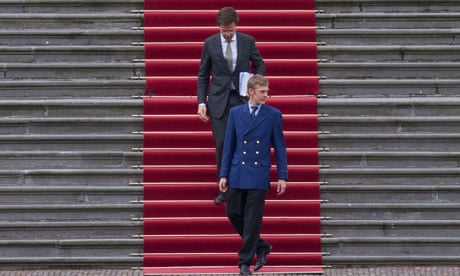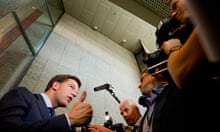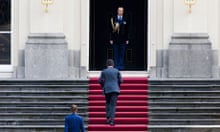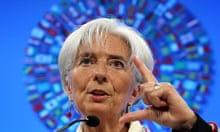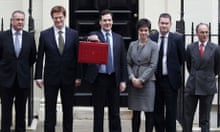For over two years, the mainstream political elites of Europe have been battling to save the single currency, seeking its salvation in a German-scripted programme of austerity and legally enshrined fiscal rigour that curbs the budgetary sovereignty of elected governments.
In elections in France on Sunday, in the Royal Palace in The Hague on Monday, and on Wenceslas Square in Prague on Saturday, a democratic backlash appeared to be gathering critical mass as the economic prescriptions of the governing class collided with the street and the ballot box. The collision looks likely to bring down three European governments.
Mark Rutte, the centre-right Dutch prime minister, threw in the towel on Monday, submitting his resignation to Queen Beatrix after seven weeks of fruitless haggling over colossal spending cuts, which are required to comply with new European rules he has done much to design.
After the biggest popular protests in Prague since the velvet revolution brought down communism, the rightwing government of Petr Necas, close allies of David Cameron, teetered on the brink, because of unpopular spending cuts as well as sleaze.
Most crucially of all, the Sarkozy era in France looked to be over, having dazzled briefly and faded fast.
"There's a new uncertainty," said Paul De Grauwe, a leading Belgian economist. "Now we will have to see what will happen with the fiscal pact, and how the markets react."
The French delivered a loud non to Berlin's euro policies, handing a first-round victory to the socialist François Hollande, whose central campaign pledge was to reopen Chancellor Angela Merkel's eurozone fiscal pact, an international treaty signed by 25 EU leaders and currently being ratified. Almost one in five French also voted for the europhobic Front National of Marine Le Pen, who wants the single currency scrapped and the French franc restored.
In the Netherlands, Geert Wilders, who also wants a referendum on the euro, felled the Rutte government by refusing to back up to €15bn (£12.2bn) in savings to keep the country within the currency bloc's new rules.
There will now be early elections later this year, which may turn on one single issue.
"Europe will be the main political divide in Holland," said Paul Nieuwenburg, a political scientist at Leiden University.
Wilders, the anti-Islam and anti-EU populist, has already pledged to make Europe the main election issue, announcing he will not agree to cut Dutch pensions to suit "diktats from Brussels".
On the hard left, the Socialist party, which is also europhobic, is riding high in the opinion polls, meaning that the anti-EU far right and hard left, between them, could take a third of the second chamber in The Hague.
The fall of Sarkozy, if confirmed, and the demise of the Rutte government after only 18 months in office add to the political wreckage littering the chancelleries of Europe.
In the past two years, as a direct result of the debt and deficit crisis, the governments of Ireland, Portugal, Spain, Greece, Finland, Slovakia, and Italy have fallen.
"A majority of voters are kicking out incumbents," said Thomas Klau of the European Council on Foreign Relations, in Paris, and the author of a book on the euro. "But despite the magnitude of the crisis, voters still trust mainstream parties enough. That's a tribute to stability. It's not a vote of defiance, bringing in extremists, rather a vote of sanction against a collective eurozone leadership."
But the German government said Le Pen's strong showing in France was "alarming". In her first presidential campaign, Le Pen won the support of one French voter in five. She has been fortunate in her timing, with two big contemporary issues – the euro crisis and Muslim immigration – fuelling the rise of illiberal populism everywhere in Europe except for Germany and the Iberian peninsula.
Islamophobia has become the new antisemitism for a generation of anti-establishment rebels in France, the Netherlands, Austria, and Scandinavia.
And the age of austerity decreed by Europe's leaders as the answer to runaway debt, soaring deficits and a failing euro also supplies fertile ground for the populist campaigners.
As the euro crisis drags on, things will get worse for ordinary folk, impacting on the real lives and economies of Europe in the form of unemployment, slashed benefits, credit crunches, banking crises, and company closures. The populists are well placed to benefit from the perceived failures of the mainstream parties and the EU governing elite.
They may also gain from the mismatch between what people are voting for – a tempering of austerity – and what they are getting: a new European regime dictating and policing the taxation and spending policies of national governments. In the gap between mandate and delivery, between politics and economics, lie the seeds of a new crisis of democratic legitimacy.
"There's an urgent need to adapt eurozone budgetary planning to shifting realities," said Klau. "Hollande means it when he calls for a refocusing of the crisis-fighting strategy away from austerity alone to include measures to boost growth. And he will get support from other European capitals if he plays his cards right."
The same day France decides between Hollande and Sarkozy, the Greeks will also elect a new government. They are almost certain to opt for politicians promising to row back on the radicalism of the social revolution being imposed there by the eurozone as the price of hundreds of billions in bailout funds.
And the relatively young governments in Rome and Madrid, committed to root-and-branch reform of sickly economies but bridling at the depth and the speed of the changes demanded by Berlin and Brussels, will be grateful if a President Hollande represents a catalyst and succeeds in negotiating a relaxation of austerity with Merkel.
"All this could push Germany into accepting less tight conditions for the rest of the eurozone," said De Grauwe. "The wariness about Europe is intensifying everywhere. The eurozone is very fragile. You can only maintain it with greater solidarity."
The Dutch predicament is a prime example. For the past 18 months, the finance minister, Jan Kees De Jager, has been the loudest advocate for the most rigorous austerity for the bailed-out countries of the eurozone, and for the punitive new fiscal rules.
Hoist on its own petard, his government has fallen because it cannot agree on the spending cuts required to meet the new rules by next year.
But the Dutch economy is fundamentally sound and prosperous, with low unemployment. The head of the national office of budget forecasters, Coen Teulings, says the government simply needs time to make the structural changes required to comply with the rules.
To insist that all this be done within a year, entailing huge savings and cuts that will make a relatively benign situation worse, represents a triumph of dogma over pragmatism.
"That's the major problem of the European system," said Klau. "It's too inflexible."
